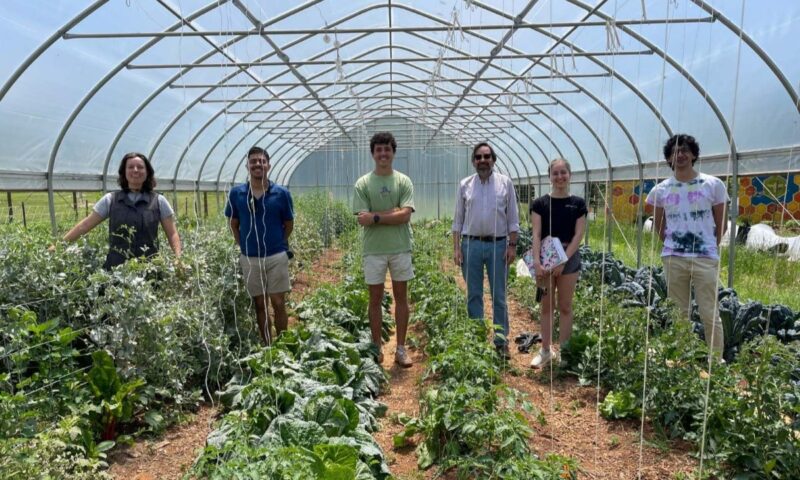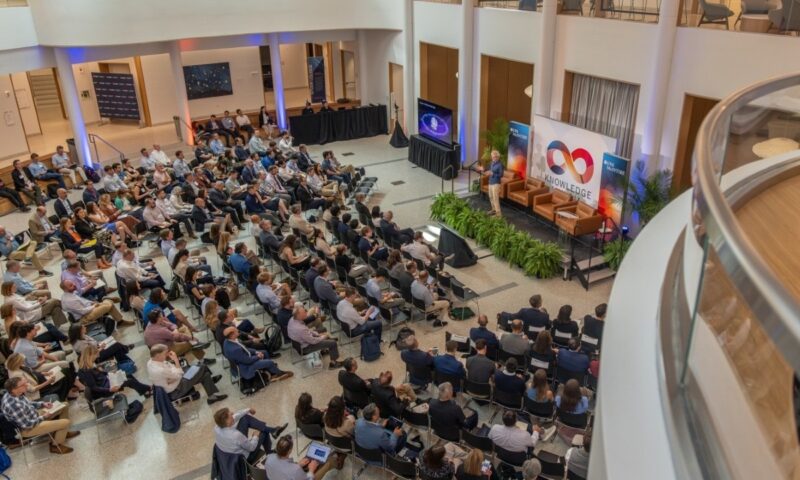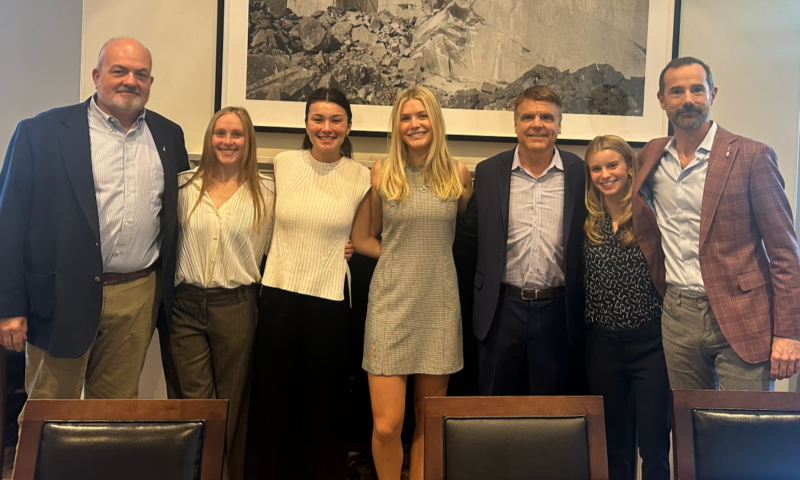Virginia Sen. Tim Kaine spends much of his time asking tough questions of government officials. This semester, McIntire students got their turn to ask the senator questions about some of the most pressing issues of the day as part of Professor Rick Carew’s “Global Digital Divide: Big Tech in a Multipolar World” course.
Appearing via Zoom from his home office in Richmond just minutes after passing a nearly $500 billion COVID-19 relief package, Kaine provided McIntire students with an insider’s view on how policymakers are grappling with the ongoing crisis and addressed themes from the course, including the U.S.-China economic rivalry and the impact of technology on business and society.
Kaine’s Q&A session was the capstone of a semesterlong enterprise by Carew to have his course—one of three launched in spring 2020 as part of McIntire’s Global Challenges Initiative—offer students unique insights from experts and decision-makers operating at the intersection of business, policy, and society. Other highlights included former Goldman Sachs Partner and UVA Miller Center Professor Shirley Lin discussing her bet on a young Chinese entrepreneur, Jack Ma, by leading the first Alibaba fundraising round in 1999.
The 18-student seminar for McIntire fourth-years delved deeply into the economic concerns and political-social impact of technology, examining the differences and similarities between Silicon Valley and China’s business culture, analyzing the role of Russia in spreading disinformation via social media, and undertaking a congressional hearing exercise in which students debated whether to allow China’s Huawei to operate within the United States.
“The Global Initiative is about going beyond study abroad as the core of students’ international experience at UVA,” Carew said. “After spending a dozen years both reporting on China as a foreign correspondent and advising senior executives in China, I wanted to give students a fresh perspective on how global business is changing. McIntire students are open-minded and receptive to being challenged by seeing the world from a new angle.”
Perspectives like those of Kaine, who sits on the Senate Committee on Foreign Relations, broadened the students’ worldview by examining the role of government in a pandemic and its impact on business and international affairs. Although his most recent work attempting to restrict presidential war powers has been connected to cyber issues and international relations—topics central to much of the “Global Digital Divide” curriculum—he reflected on the impact of the pandemic with regard to technological issues, policy, and the potential for transforming societal norms in the years ahead.
For example, Kaine has worked to expand broadband access across Virginia to bridge the digital divide between rural Appalachia and urban Northern Virginia. He also noted that changing workplace norms around teleconferencing and remote work could provide potential solutions to issues like Northern Virginia’s traffic congestion if workers decide to work more from home post-pandemic.
Tech Effects, Privacy, and the U.S.-China Relationship
Many of the student questions probed issues that had been in the headlines that very day. Topics ranged from conflict arising between mitigating state stay-at-home orders with mixed messages from the federal level, negotiating the COVID-19 relief bill, managing the long-term impact of a growing government deficit, leadership strategies during a crisis, universal healthcare, STEM education, and more.
Other questions dealt more specifically with topics that had been at the forefront of the course curriculum, including the unintended social effects of technology, including privacy concerns, and the many influences of technological actors on the global stage.
Student Nathan Berry (McIntire ’20) asked Kaine about the delicate balance between protecting privacy and national health by implementing contact tracing and location data, in light of the lessons learned from 9/11 and the Patriot Act. Kaine responded by using the biblical story of the Tree of Knowledge, noting that having information has always presented positive and negative aspects. But he ultimately explained why those in government are particularly unsuited to make the proper determination about privacy, since they had given up any expectations for themselves decades earlier.
“If you leave it to us to try to balance between protecting security and protecting privacy, when none of us even remember what it’s like to have a legitimate expectation of privacy, we will always balance it more toward the protecting national security side,” Kaine admitted. “But when it comes to issues that try to balance security imperatives with privacy in the technology space, we are as good as the stakeholders that we assemble around the table. And we have to assemble stakeholders who include really smart representatives of civil society who can really make the pro-privacy case.”
George Moss (McIntire ’20) raised another theme of the course concerning the push-and-pull paradigm defining U.S. and China trade interactions. Moss asked how the United States might improve relations with China and if China should be viewed as a strategic competitor or partner.
“The U.S.-China relationship will be the most important relationship in the world for the rest of the century,” Kaine said, defining China not as an ally, but as a competitor the United States will continue to face in many areas.
“They’re a military competitor. They are an economic competitor. They are a diplomatic competitor. They’re a competitor in every realm. They want to win, and we should want to win. But that doesn’t mean we can’t cooperate on some things.”
Kaine returned to the larger issue at hand in the pandemic, explaining that the Chinese government simultaneously created problems by not being transparent about transmission of the coronavirus, yet despite travel restrictions, helped to get Americans home. He stressed that cooperation going forward is key.
“Every day, we’re dealing with China over massive trade, economic challenges that are affecting us both, a virus that’s affecting us both, and a whole series of other issues where we’re very much intertwined. And we will be strategic competitors, but we don’t have to define that as adversaries—although there will be times when there will be adversarial aspects of it,” he said. “A pandemic response, traditionally, has been the perfect example of an area where we could combine science to help advance a vaccine, a treatment, an antibody test, and the production of equipment that could be used when the virus starts to hit Africa particularly hard.”
Putting into perspective one of the most important power struggles responsible for many of the issues that the class studied during the semester, Kaine posited, “Why shouldn’t the U.S. and China be working on those things together?”
As the hourlong session wound down, the senator voiced his gratitude to the students for the quality of their questions and concluded the session with a heartfelt message noting that the students had much to be proud of even though they would be unable to walk the Lawn this spring at graduation. Carew thanked Kaine for taking the time to give the McIntire students “something special for the end of their term.”
Capstone for a Memorable Course
Adapting to the move online, the “Global Digital Divide” students spent the final weeks of the semester collaborating in groups on researching topics ranging from assessing whether the expansion of Silicon Valley companies into Africa constituted a new form of digital colonialism to the prospects for digital currencies including Facebook’s Libra.
Drawing on support from advisers culled from editors and reporters Carew worked with during his time at The Wall Street Journal, the students self-published essays and a podcast online. The project served as a capstone they could share with friends and family to show the work they had done during the class.
“What really differentiates the course from others I have taken has been the continuous integration with professionals in the field across all the units we have studied,” says Anjali Khanna (McIntire ’20). “Professor Carew has really been a tremendous resource throughout the class. By using his expertise from his time covering Asian business—to add an experience-based perspective to the class —or pulling from his extensive network, he really helped us to understand the material in a real-world context. As I will be going into technology, media, and telecom investment banking upon graduation, being knowledgeable about the core technologies and the regulatory and ethical challenges that Big Tech players face will give me a significant advantage.”



